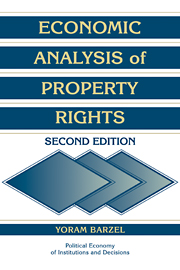Book contents
- Frontmatter
- Contents
- Series editors' preface
- Preface to the second edition
- Preface to the first edition
- Introduction
- 1 The property rights model
- 2 The public domain: Rationing by waiting and price controls
- 3 Contract choice: The tenancy contract
- 4 Divided ownership
- 5 The old firm and the new organization
- 6 The formation of rights
- 7 Slavery
- 8 Wealth-maximizing constraints on property rights
- 9 Property rights and non-market allocation
- 10 Additional property rights applications
- 11 The property rights model: Recapitulation
- References
- Index
5 - The old firm and the new organization
Published online by Cambridge University Press: 05 June 2012
- Frontmatter
- Contents
- Series editors' preface
- Preface to the second edition
- Preface to the first edition
- Introduction
- 1 The property rights model
- 2 The public domain: Rationing by waiting and price controls
- 3 Contract choice: The tenancy contract
- 4 Divided ownership
- 5 The old firm and the new organization
- 6 The formation of rights
- 7 Slavery
- 8 Wealth-maximizing constraints on property rights
- 9 Property rights and non-market allocation
- 10 Additional property rights applications
- 11 The property rights model: Recapitulation
- References
- Index
Summary
For many years the theory of economic organization was nearly synonymous with the theory of the firm. Standard economics textbooks occasionally referred to other forms of organization, such as the family and government, but the firm was the only organization consistently and systematically discussed. Nevertheless, the exact function of the firm remained unclear. Knight's (1921) attempt to add substance to the construct called the “firm” did not fare very well, and Coase's (1937) revolutionary approach to organization required several decades, as well as his own work on social cost, to begin to influence economists. Both of these efforts focused on the firm. In more recent years, Coase's transaction cost ideas have been exploited by economists attempting to generate a theory of the firm, as well as by others who question the usefulness of such a theory. The insights gained through these efforts have been considerable, yet our understanding of organization is only in its infancy. In this chapter the transaction cost approach to organization will be extended.
In order to appreciate the need for the transaction cost approach and its contribution, one must first examine the received model of the firm extensively and critically. I attempt to show that as a description of real firms the received model is untenable, and that under conditions that would allow a textbook firm to exist, its function would become inconsequential. Turning to general problems of organization, I first consider the distinction between market and firm transactions and the significance of Coase's discussion of liability.
- Type
- Chapter
- Information
- Economic Analysis of Property Rights , pp. 65 - 84Publisher: Cambridge University PressPrint publication year: 1997
- 1
- Cited by



